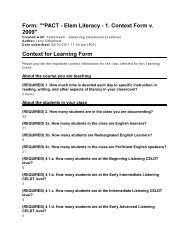The Tutoring Book - California State University, Sacramento
The Tutoring Book - California State University, Sacramento
The Tutoring Book - California State University, Sacramento
You also want an ePaper? Increase the reach of your titles
YUMPU automatically turns print PDFs into web optimized ePapers that Google loves.
A Word about Being Directive<br />
42<br />
Brendan Johnson<br />
Spring 2010<br />
One of the biggest struggles as a new writing tutor is negotiating that thin line between giving<br />
non-directive, facilitative advice to our tutees and being overly directive, appropriating their ideas to fit<br />
into our own schema of what makes a good piece of composition. This may sound a little discouraging,<br />
but this is a problem that will persist throughout your tutoring career. <strong>The</strong> purpose of this article is not to<br />
give you some sort of secret model for how to be a non-direct, facilitative writing instructor, but rather to<br />
reassure you that there is nothing wrong with being direct and straightforward at times.<br />
Reading through the tutoring handbooks, you have no doubt already been exposed to a number of<br />
different theories on how to conduct the ideal writing session. And if you tried to incorporate every theory<br />
that you encounter over the course of the semester into one tutoring block, your head (as well as your<br />
tutee’s head) might possibly explode. One essay tells you to work collaboratively, coming to rhetorical<br />
decisions together with your tutee as two “knowledgeable” peers. One or two essays might tell you to be<br />
non-directive and “minimalist” in your advice and questions, allowing the student to come to the answer<br />
through their own intellectual exertions. A number of essays insist that your primary goal as writing tutor<br />
is to reveal to the student that her paper is not her own, but that it is actually a cultural construct, or<br />
perhaps a post-colonial “middle discourse,” shifting between the language of academia and her own<br />
particular discourse community. Ok. Now try and incorporate all these tutoring methods into a thirtyminute<br />
timeslot. Wow! This isn’t possible, nor should it be encouraged.<br />
Now, to be even more incredibly reductive of the writing theories and practices you will<br />
encounter over the semester, I would say that the vast majority of the essays generally urge tutors to take<br />
a non-directive, facilitative approach when addressing a student’s writing. And I would absolutely concur<br />
that this is the ideal way to conduct a tutoring session: the tutor acting as a knowledgeable peer, giving<br />
helpful advice, asking constructive questions, but not necessarily tampering with the ownership of the<br />
tutee’s text. However, this ideal situation is rarely, if ever, the case. In fact it is often a great struggle to<br />
keep the reins of the paper in the hands of the tutee. Often these writers are more than happy—if not<br />
eager—to have their “knowledgeable” writing tutor rhetorically “hijack” their papers. <strong>The</strong>y see the<br />
writing center as a place where their papers will be revised and redirected by the careful hands of a<br />
“master of writing.” This is a dangerous, but common situation; and often when you meet with a new<br />
tutee, a good portion of your first session will be spent explaining that editing and aggressive revision are<br />
not the responsibility nor the desire of writing center tutors. Krista Tawlks, a former Writing Center<br />
Tutor, has written an excellent article that weighs the pros and cons of directive versus non-directive<br />
approaches to tutoring. She gives very helpful strategies and suggestive questions to ask when “adapting a<br />
particular approach” (Fall 2009). (If Dan hasn’t assigned this article for the semester readings, I<br />
encourage you to look it up in the archives.) Again, the rationale behind my article is not to gainsay or<br />
undermine any of her valuable advice, but rather to encourage you not to always be concerned if you feel<br />
that you are being too directive or prescriptive.<br />
It’s Impossible Not To Be Directive:<br />
If you think about it closely, it is impossible not to be directive. Almost any suggestion that you<br />
make to a tutee is directive in some sense, however overt or subtle. Any comment you make about an<br />
aspect of a paper, any question that you answer or deflect with another question is directive. Even when<br />
you make suggestions or you draw attention to a certain portion of the paper that is confusing, you are<br />
suggesting that something needs to be changed. Even if you are not supplying the student with a

















